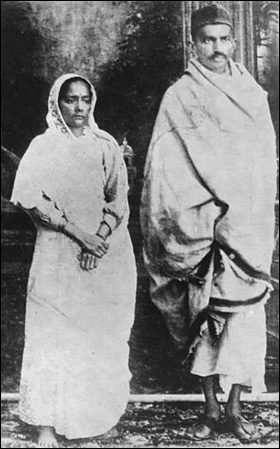
GANDHI'S EARLY LIFE

Gandhi's early life was in turmoil. During his early years, his father suddenly got very ill, putting him under a lot of stress as he not only had to cope with his schoolwork, but also had to look after his sick father. At the early age of 13, Gandhi was drawn into a pre-arranged marriage with Kasturbai Makanji, also 13. After his marriage, he resumed his studies and worked hard, hoping to follow into his father's footstep, but attained only moderate success in school. After completing his early education, Gandhi went to London and studied law at the University College. In 1891, he became a lawyer and, after which, returned to India. Failing to establish a law practice in Bombay, Gandhi worked for an Indian firm with interest in South Africa.

COLOR PREJUDICE
In South Africa, Gandhi did not take long to discover that Indians were not held in much regard and were treated with scant respect. Racial discrimination was rife and widespread. One day, while travelling on the train, Gandhi was pushed out of the train when he refused to leave his first-class seat for a white person, as the whites were seen to be the superior class and the minorities were of lower class. Systematic legal discrimination was gathering momentum. This incident and many other instances of racial discrimination inspired Gandhi to fight for the rights of the minorities and not allow them to be bullied by the majority population.
Gandhi was more interested in improving the human means than in attaining political ends. Gandhi recognized that the whites in South Africa thought they needed protection against a majority consisting of Negroes and Indians. It explains why the whites actually imposed many laws, restricting the Indians from voting and owning lands.
"They treat us as beasts," Gandhi exclaimed at the meeting in Madras, on October 26, 1896, during a brief visit to his native land. The Boer War having been waged from 1899 to 1902 between the Dutch settlers and the British and won by the latter, both sides proceeded to heal their wounds, as it is frequently the case, with the balm of a third party's misery. The Indian question in South Africa consequently became a political football.
The existence of more than one hundred thousands Indians was in jeopardy. Gandhi believed he could save them.
COURAGE UNDER ATTACK
Gandhi did not expect to eradicate white prejudices. He wrote in the Times of India of June 2, 1918; "Prejudices cannot be removed by legislation .......they yield only to patient toil and education." Nor did he hope to end segregation quickly. The Indians, he declared, "feel the ostracism but they silently bear it". His quarrel with the South Africans was for "feeding the prejudice by legalizing it."
Two years later, Gandhi volunteered to raise a corps of Indians stretcher-bearers and medical orderlies for the British side in the Boer War. The Natal government spurned the offer. Nevertheless, Gandhi and other Indians began at their own expenses to train a nurses. The government once again turned down the offer for Indians' services. However as the Boers were advancing, many people died and the wounded lacked adequate care. Finally, the authorities sanctioned the formation of an Indian Ambulance Corps. Three hundred free Indians enlisted as well as eight hundred indentured laborers furloughed by their masters. Gandhi led his men on to the battlefield.
When the Corps disbanded, Gandhi and several other comrades were awarded the War Medal. Gandhi had hoped that the fortitude of the Indians in war would appeal to the South Africans' sense of fair play and moderate white hostility to colored people.
In his fight for the rights of the minorities, Gandhi abided by the rule of non-violence, whereby he strongly believed in the idea of converting the enemy and avoiding a direct confrontation; to win him rather than harm him. He was quite successful in his attempt and never did he use violence. This was major turning point in his life as he changed from a timid boy to an outspoken man.
[Home] [Next} [Gandhi's Contributions To The World] [Photo Archive]